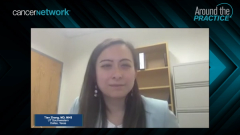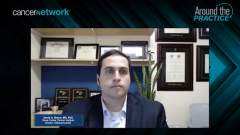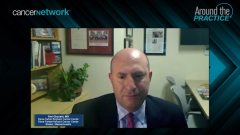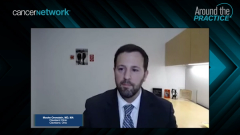
Final Thoughts on Advanced RCC
Drs Orenstein and Braun close out the program by examining unmet needs in the advanced renal cell carcinoma treatment space, as well as emerging options.
Episodes in this series

Toni Choueiri, MD: This has been really great but let me ask Dr. Orenstein before we finish by Dr. Braun. I want to ask Dr. Orenstein about some of the clinical spaces. Let's not talk science and new target here. What do you think about the future in new spaces here, adjuvant, neoadjuvant, and post-VEGF and PD1 and you have only two minutes?
Moshe Orenstein, MD, MA: Great. I'm going to move backwards. I would say that there's an unmet- Again, leaving novel agents out of the question. We're all excited about a variety of agents but let's talk about optimizing care for patients using the multiple approved agents and combinations we have now. I think two questions in the metastatic setting that really need to be answered is number one, what's the duration of therapy necessary for a patient to have a long-term durable response. If we solve conditional survival data from checkmate two and four and patients treated with Ipilimumab and Nivolumab about if someone's progression-free and alive at three years, the odds of them being the same at five years are good. What's the proper duration both for the IO/IO combinations and IO/TKI combinations? Can we stop one agent, can we stop both? And along those lines, it's what are the salvage options for patients not just in the sense of if patients progress on Ipi/Nivo [ipilimumab/nivolumab] what do we switch them to. But is there a role for some adaptive design, right. Patients on Ipilimumab and Nivolumab progresses on the Nivolumab maintenance about adding Cabozantinib in. Or what about a patient who's on a TKI [tyrosine kinase inhibitor]? What about salvaging them with an IO on top of the TKI. Not switching but adding something on so I think duration of therapy and salvage options, some of which are going to be answered in pedigree are really important using the drugs we have today. In the adjuvant space, again, moving from metastatic to adjuvant, you know better than anyone else Dr. Choueiri, what we need to see is whether or not giving an IO agent in the adjuvant setting improves survival. Does it move the ultimate goal post and the adjuvant setting? We need to be a have a different threshold for toxicity than in the metastatic setting knowing that many patients will be cured just with surgery alone. When will we see those data for the survival in terms of really changing the standard of care? And then in the neoadjuvant setting, there are some ongoing trials. I'm going to talk about neoadjuvant for patients who actually have metastatic disease. What's the role of cytoreductive nephrectomy upfront? What's the role of cytoreductive nephrectomy after an induction of an IO/TKI or IO/IO. There are ongoing files for that, both intergroup as well as IIT's going on but I think all of those use the currently approved agents. Which again, have moved survival from 12 to 18 months to beyond four years and optimizing the care now with the currently approved agents.
Toni Choueiri, MD: That's a great answer. I know it's a bit unfair question for two minutes. Before moving to targeted agents or any new agents with Dr. Braun and probably finish this, I think I want to bring back the adjuvant setting for overall survival because the median follow-up with the adjuvant trial was two years. We see that breast cancer community has accepted disease for survival and it seems the bladder cancer community have gone all the way with disease-free survival. The recent approval doesn't have any data for overall survival, but I think you would treat kidney as bladder. And I would say you're one of the folks that would prefer despite you will discuss with patient and FDA approved the drug, but you would like OS as a primary endpoint to be met in adjuvant kidney and urothelial cancer. Is that a fair question?
Moshe Orenstein, MD, MA: Is that to me or to Dr. Braun?
Toni Choueiri, MD: Yes, I'm asking you because you are right, there is two camps folks that already moved on and folks that still want to see overall survival in all GU malignancies.
Moshe Orenstein, MD, MA: No, I think it's a fair question and I think with disease-free survival, that should serve as an endpoint. I think it's reasonable to have a drug approved but I think the discussion with patients is a little different. Whereas, when there's an overall survival benefit it's a slam dunk essentially and when there's a disease-free survival benefit, patient selection is more important, a higher risk patient, a patient with sarcomatoid features, a node-positive patient, et cetera. Whereas, when there's overall survival benefit, the default is to give it. And so, I think that's where it is. Of course, should the FDA [Food and Drug Administration] approve? It's appropriate to be used and DFS [disease-free survival] is an appropriate endpoint in the adjuvant setting. The discussion with patients changes based on DFS [disease-free survival] versus OS [overall survival].
Toni Choueiri, MD: And I think that's very sensible especially when you have at least a trend or anything but like that. Dr. Braun, we cannot finish with you at the end. Any exciting targets for you? Let's start with the metastatic disease. Give us one target since we're close to the end that you are excited about and why.
David A. Braun, MD, PhD: It's a great question. I think there's probably lots to be excited about. I would say that one that's probably closest to actually benefiting patients is going to be HIF2 alpha inhibition and that's something with lawsuit. And that's something we're seeing already benefit for and an approval for a very specific subset those with kidney cancer associated with VHL syndrome. And we're eagerly awaiting those phase three results for Belzutifan and the sporadic clear cell RCC population. And so, to choose something that's closest to actually benefiting patients is a new target, I think that's it. Truthfully, I think well, that's going to be helpful for a lot of patients. I think it's not going to move the needle a huge amount in getting what I'm hoping to aim for in our lifetimes which is actually higher rates of cure for advanced kidney cancer. And I think something like that is really going to require new targets and new approaches and I think those are going to be immunotherapy-based approaches. I think there's a lot that's much further behind in the pre-clinical development thinking of antigen direct therapies, new approaches for immunomodulation. But those are unfortunately still years away, but I think those are going to be the ones with most long-term promise. But in the short term something like Belzutifan I think is really appealing.
Toni Choueiri, MD: And I think that's fair, and we know that Belzutifan is already approved in patients with VHL syndrome which is a very small proportion of patient with RCC [renal cell carcinoma]. And RCC associated other VHL related tumors and there is a phase one, two that showed a response rate with this agent up to 25% in refractory population where majority of patients receive prior VEGF TKI [Vascular endothelial growth factor receptor tyrosine kinase inhibitors] and immune checkpoint inhibitor which led to an ongoing phase three trial with single-agent F2 inhibitor Belzutifan and versus Everolimus. Indeed, patient of tumor progressed after PD-1 inhibitor and after VEGF TKI [Vascular endothelial growth factor receptor tyrosine kinase inhibitors] so this is overall well done. Well, I want to thank you, Dr. Zhang, Dr. Orenstein, Dr. Braun for joining me, and joining us, joining um you know this program and this lively discussion on renal cell cancer brought to you by Cancer Network. And thank you for our viewing audience. We hope you found this interactive discussion to be informative, to be beneficial to your clinical practice, and most important, I hope you and your families are staying safe and healthy during this terrible pandemic.
This transcript has been edited for clarity.
Newsletter
Stay up to date on recent advances in the multidisciplinary approach to cancer.









































